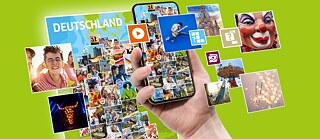German language digital

The coronavirus made conventional language work practically impossible. It was time to take new pathways.
By Karolin Müller, Timo Kozlowski, Sarah Goerke, Franziska Wild, Anja Veldhues, Sophia Schwager
Within a few weeks, the spread of the coronavirus made our usual modes of offering German courses, taking exams and addressing the target groups of the Bildungskooperation Deutsch impossible. In some cases, the teachers and we in language work were able to fall back on existing digital offers, in others we pushed forward ongoing developments at full speed – but sometimes we had to take entirely new pathways.
„Deutsch online“
Whether in a classroom-based course or in an online format, our German courses are all about one thing: speaking the language and enjoying it. This also applies to the linchpin of our online programmes: the Deutsch Online courses at levels A1 to C1.Deutsch Online was originally developed for individual instruction. Since participants work through the course content independently, it was important for us to develop a learning method of small steps. Many types of exercises were created especially for Deutsch Online – right down to the design of the classroom. What distinguishes the Goethe-Institut’s Deutsch Online courses from those of other online language course providers, however, is the personal support provided by a tutor, sometimes via written feedback, sometimes via virtual meetings using a web conferencing tool.
Some people, however, prefer to learn in a group in order to approach the new language collectively. For this purpose, the Deutsch Online Gruppenkurs was developed, where participants can use what they’ve learned and share ideas in German with the others in the course. The variation Deutsch Online Blended Learning, on the other hand, is based on the “flipped classroom” model: The participants work on the vocabulary and structures in a lesson on their own via the assignments in the online classroom. Afterwards, they meet with their tutor at the Goethe-Institut or, during the pandemic, in the virtual space to apply what they’ve learned – in other words, to communicate in the foreign language. That is the be-all and end-all. Then a new cycle begins.
Deutsch Online has been a driver of innovations for the Goethe-Institut in recent years. But the journey isn’t over yet. The next adaptation is Deutsch Training Online, where participants initially learn without a tutor in the online classroom and can book live lessons with individual tutors as needed. This is presently being tested at pilot institutes.
Digital exams
Since 2019, we have also been offering digital exams at selected locations, which are taken on a laptop in the examination centre. At present, the Goethe-Zertifikat B1 and the Goethe-Zertifikat B2 are available in digital form. The next exam to be digitised will be the Goethe-Zertifikat A1: Start Deutsch 1, which is required, for instance, for visa applications for spousal reunification.The demand for examinations that can be taken at any location is also steadily increasing, and not only because of the pandemic-related restrictions on examination operations. For many people interested in taking an exam, it is not now possible to do so because – for example in crisis regions – there are no examinations on offer in the country or the undertaking involves a great deal of effort if, say, national borders need to be crossed. An examination that can be taken regardless of location is therefore an important offer, and we are currently working hard to develop it.
There are still some challenges to overcome along the way. Our examinations have to meet high quality standards, also in the case of location-independent examinations. This includes the highest level of fairness and security, guaranteed by skilled examination supervision. In the case of location-independent examinations, this must be done virtually, requiring prudent clarification for each country of operation, not only from a technical but also from a legal point of view (e.g., data privacy). We are presently working on this with great commitment.
The highest level of fairness and security.
Deutschlandcollage
Our largest target group is the approximately 13.5 million pupils learning German at schools. Children and young people are usually less interested in grammar, but all the more fascinated by life in Germany. For this purpose, we developed the Deutschlandcollage – a map of Germany in a fresh design with interactive augmented reality functions – and the app Deutschland. Kennen. Lernen.The free Deutschlandcollage invites young learners of German at A2 level to get to know more about life in Germany. The six topics range from leisure activities and research to environmental awareness and pop culture to everyday student and working life. Interactive exercises and narrative media elements such as short films provide variety and enable users to improve their vocabulary as well as their reading and listening comprehension.
On the accompanying website, users can find both the Germany poster as a PDF to download and a short explanatory video that shows the interaction between the poster and the app. German teachers can download free teaching materials for use in the classroom. There are worksheets with further exercises for each topic. Since the beginning of March, the free app Deutschland. Kennen. Lernen. has been available in the Apple and Google app stores worldwide.